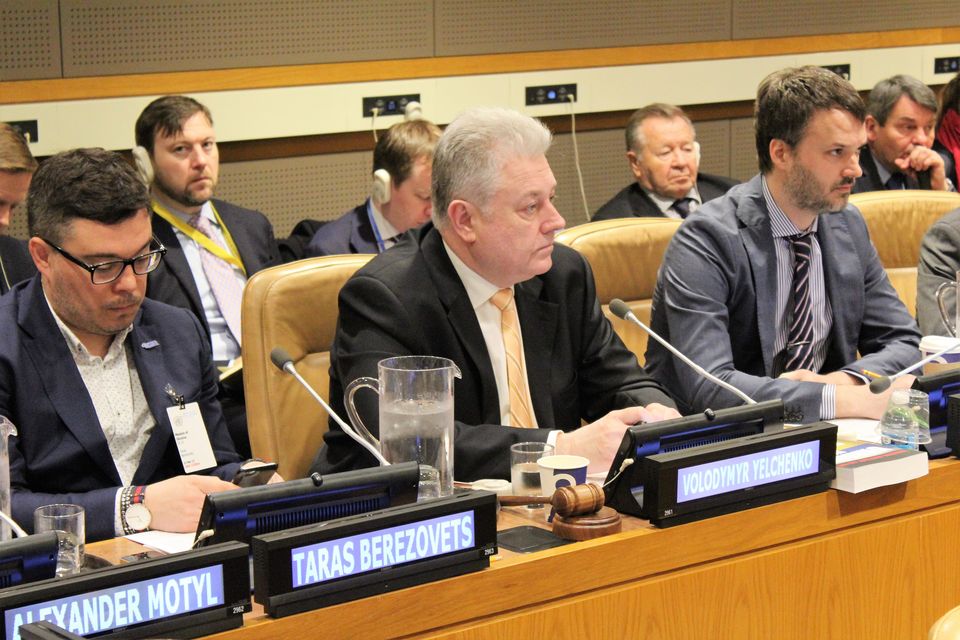Opening Remarks by Ambassador Volodymyr Yelchenko at the Arria-Formula Meeting of the UNSC on Hybrid Wars

Excellencies,
Distinguished Delegates,
Ladies and Gentlemen,
I have the honour to welcome all of you here at the UN at the Arria — formula meeting on the issue of “Hybrid Wars as a Threat to International Peace and Security”. I appreciate your interest in this topic. Without prejudging our discussion, let me briefly provide some general remarks.
Modern perception of war is, to much extent, based on the book by Carl von Clausewitz “On War“. I do not need to quote here his famous definition of war. The ‘Clausewitzian war’ requires the state to act in conjunction with the people and the army, the state becoming a massive engine built to exert military force against an identical opponent. Through the 20th century, this concept developed to what is now known as ‘total war’.
In today’s globalised and interdependent world and with the development of global information networks and media, contemporary warfare got new dimension. New strategies of war are developing, new technologies are used and new actors are coming to the frontline. These are the features of a “total war” of the 21st century, which is now called hybrid warfare.
As mentioned in the Joint Framework on countering hybrid threats, adopted by the European Commission in 2016, in hybrid wars the “mixture of coercive and subversive activity, conventional and unconventional methods (i.e. diplomatic, military, economic, technological)” is used in coordinated manner “by state and non-state actors to achieve specific objectives while remaining below the threshold of formally declared warfare”.
The most commonly cited recent example of hybrid warfare is the Russian aggression against Ukraine. It is changing the perception of threat in Europe. It also changes the global security order, which, after the Second World War, for a long time was more or less successful in ensuring peaceful coexistence.
An important lesson we have learned from the ongoing hybrid war against Ukraine is that such wars begin long before the first shots were fired. First signs of aggression remain unnoticed at the initial stage, before violence starts. To highlight this important aspect it is worth mentioning that until early 2014 Ukraine did not consider Russia as a potential military adversary. As mentioned earlier von Clausewitz wrote: “The conqueror is always a lover of peace; he would prefer to take over our country unopposed.”
Thus, today’s hybrid warfare involves a tool set of synchronized military and non-military methods including political pressure, international and domestic propaganda, economic sanctions, cover operations, cyber-attacks etc. This also include “asymmetrical responses”, like the one used by Milosevic in Kosovo in 1999 when 700,000 Kosovo Albanians were driven out to the neighbouring countries in an attempt to provoke humanitarian crisis there. Assad regime and its allies used the same tactics lately.
Another characteristic feature of modern hybrid war is its destructive impact of information. Manipulations and “fake news” became a new powerful weapon. This tool is particularly effective against democratic societies, which promote and protect free flow of information that in its turn shapes public opinion that have to be taken into account by elected governments. Media may become more destructive than bombs. You may recall the role of propaganda of hatred in Rwandese media before genocide of 1994. Today, in Russian media on a daily basis you may hear calls to bomb Ukrainian cities and kill Ukrainians.
Today, hybrid threats are included in military strategies of some UN Member States, with specific references to the Russian aggression in Ukraine.
Dear Colleagues,
This meeting is the first attempt to bring the issue of hybrid wars to the attention of the Security Council as well as of a wider UN membership. It is important to discuss the potential scope and possible modalities of the Security Council’s work to oppose this new threat to the international peace and security.
The international community should be able to meet new challenges, to implement adequate measures against acts of hybrid warfare, to facilitate their prevention, to protect rights and lawful interests of victims and to hold culprits responsible. In this regard, it is essential to elaborate a universal definition of hybrid warfare.
We encourage Member States to use today’s discussion to contribute to our joint endeavour of addressing main aspects of hybrid warfare as a threat to international peace and security, as well as identifying possible instruments to challenge this phenomenon. We expect that today’s meeting will provide an opportunity to discuss political, military, informational, legal and psychological aspects of hybrid warfare in order to identify possible steps by the United Nations to counter existing instances of hybrid wars, as well as preventive mechanisms that could assist the international community to restrain it.
